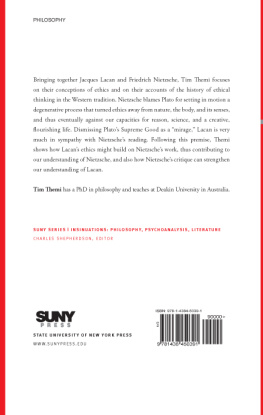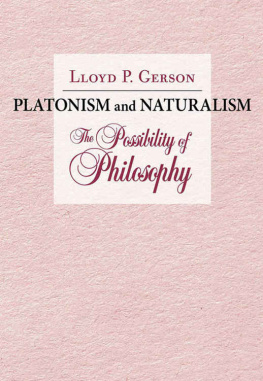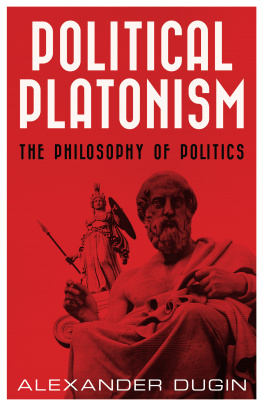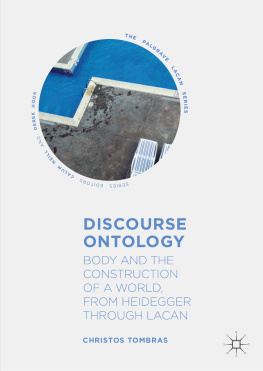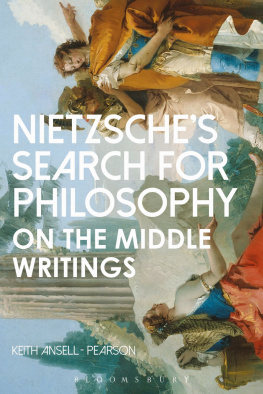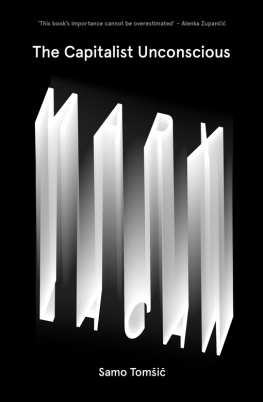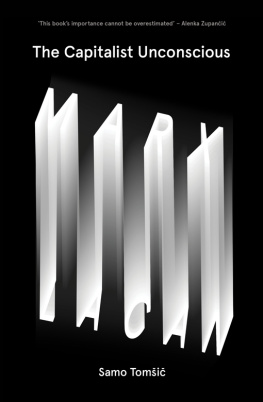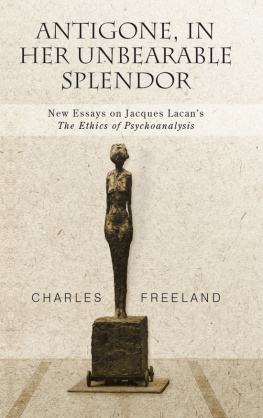Themi - Lacans Ethics and Nietzsches Critique of Platonism
Here you can read online Themi - Lacans Ethics and Nietzsches Critique of Platonism full text of the book (entire story) in english for free. Download pdf and epub, get meaning, cover and reviews about this ebook. year: 2014, publisher: State University of New York Press, genre: Romance novel. Description of the work, (preface) as well as reviews are available. Best literature library LitArk.com created for fans of good reading and offers a wide selection of genres:
Romance novel
Science fiction
Adventure
Detective
Science
History
Home and family
Prose
Art
Politics
Computer
Non-fiction
Religion
Business
Children
Humor
Choose a favorite category and find really read worthwhile books. Enjoy immersion in the world of imagination, feel the emotions of the characters or learn something new for yourself, make an fascinating discovery.
- Book:Lacans Ethics and Nietzsches Critique of Platonism
- Author:
- Publisher:State University of New York Press
- Genre:
- Year:2014
- Rating:4 / 5
- Favourites:Add to favourites
- Your mark:
- 80
- 1
- 2
- 3
- 4
- 5
Lacans Ethics and Nietzsches Critique of Platonism: summary, description and annotation
We offer to read an annotation, description, summary or preface (depends on what the author of the book "Lacans Ethics and Nietzsches Critique of Platonism" wrote himself). If you haven't found the necessary information about the book — write in the comments, we will try to find it.
Themi: author's other books
Who wrote Lacans Ethics and Nietzsches Critique of Platonism? Find out the surname, the name of the author of the book and a list of all author's works by series.
Lacans Ethics and Nietzsches Critique of Platonism — read online for free the complete book (whole text) full work
Below is the text of the book, divided by pages. System saving the place of the last page read, allows you to conveniently read the book "Lacans Ethics and Nietzsches Critique of Platonism" online for free, without having to search again every time where you left off. Put a bookmark, and you can go to the page where you finished reading at any time.
Font size:
Interval:
Bookmark:

Lacans Ethics and
Nietzsches Critique of Platonism
SUNY series, Insinuations: Philosophy, Psychoanalysis, Literature

Charles Shepherdson, editor
Critique of Platonism
TIM THEMI

Cover art courtesy of Thanasi Bakatsoulas. The work is entitled Sun-Ilios.
Published by State University of New York Press, Albany
2014 State University of New York
All rights reserved
Printed in the United States of America
No part of this book may be used or reproduced in any manner whatsoever without written permission. No part of this book may be stored in a retrieval system or transmitted in any form or by any means including electronic, electrostatic, magnetic tape, mechanical, photocopying, recording, or otherwise without the prior permission in writing of the publisher.
For information, contact State University of New York Press, Albany, NY
www.sunypress.edu
Production by Eileen Nizer
Marketing by Anne Valentine
Library of Congress Cataloging-in-Publication Data
Themi, Tim, 1975
Lacans ethics and Nietzsches critique of platonism / Tim Themi.
pages cm. (Insinuations : philosophy, psychoanalysis, literature)
Includes bibliographical references and index.
ISBN 978-1-4384-5039-1 (hardcover : alk. paper)
1. Psychoanalysis and philosophy. 2. Psychoanalysis and culture. 3. Platonists. 4. Lacan, Jacques, 1901-1981. 5. Nietzsche, Friedrich Wilhelm, 18441900. I. Title.
BF175.4.P45T54 2014
170dc23
2013015893
10 9 8 7 6 5 4 3 2 1
For Nietzsche, the way he points to the Greeks,
the will to power, and all subsequently who teach it
to Lacan for keeping Freudian experience alive.
An early version of the material in
The works of Friedrich Nietzsche: cited in-text with the abbreviations listed here. Roman numerals denote standard subdivisions and Arabic numerals section numbers: for example, GM III:20 refers to section twenty in Essay Three of the Genealogy of Morals. Prefaces are indicated with the letter P. Details of translations used are provided in the bibliography.
AC = The Antichrist
BGE = Beyond Good and Evil
BT = The Birth of Tragedy
CW = The Case of Wagner
EH = Ecce Homo
GM = On the Genealogy of Morals
GS = The Gay Science
HAH = Human, All too Human
KGW = Kritische Gesamtausgabe: Werke
KSB = Studienausgabe: Smtliche Briefe
PPP = The Pre-Platonic Philosophers
PTA = Philosophy in the Tragic Age of the Greeks
TI = Twilight of the Idols
WP = The Will to Power
Z = Thus Spoke Zarathustra
The works of Jacques Lacan and Sigmund Freud: also cited in-text. Roman numerals with the letter S refer to book numbers of Lacans Seminar; page references are in Arabic numerals and refer to English translations: for example, SVII:50 refers to page 50 of Lacans seventh Seminar. Arabic numerals following the letters SE refer to the volume number of Freuds Standard Edition: for example, SE2:70 refers to page 70 of Volume 2.
Lacans 19591960 Seminar VII, The Ethics of Psychoanalysis, forges from the Freudian field an ethics of desire that is striking in its riposte to the moral Good of Plato and Aristotle. Right from the first Seminar of the 1950s, the suggestion from Lacan was that the whole trajectory of Western Moralism has led us down the path for the race to destruction (SI:277). A Nietzschean resonance becomes manifest when we consider Nietzsches view that Platonism enacts a history of nihilism that protracts through Christianity and the modern science era of today. The six chapters of this book explore the number of ways in which Lacans ethics of psychoanalysis, as an ethics of desire, extends on Nietzsches critique of Platonismwhere as a corollary it will also be possible to take a Nietzschean optic to Lacan to illuminate the latters work in a new genealogical light.
This genealogical light may be new to readers of Lacan because although in his twenties, Lacan read and expressed great admiration for Nietzsche
As Alan Bass explains, Nietzsche comes close to Freud by seeing the unconscious as the greater part of the mind conceived in relation to the body, drives and affects; by having understood repression; by having analysed guilt as internalised aggression; and by sensing that morality and ideals are defensive distortions of the drives.
One such NietzscheLacan study that Ons may have overlooked is by Alenka Zupani, contributed to the Short Circuits series edited by Slavoj iek.
Nietzsches ethics, and by extension his entire philosophy, calls for a revaluation of all values (EH IV:1). This is because he felt they had been turned against life by the way, historically, that Platos metaphysics of the Good had later combined with Judaism to form Christianity, what Nietzsche calls a Platonism for the masses (BGE P). Lacan, for his part, in drawing subsequently on the Freudian experience, fashions out an ethics of psychoanalysis that is also skeptical of the Sovereign Good inherited from Western moral traditions, suggesting they create a barrier toward desire that leads to the inner catastrophes of neurosis (SVII:319). The present book reads Lacan and Nietzsche together on this specific point where they criticize our received notions of the Good and seek to propose an alternative. The aim, then, is to see in what way the respective ethics of Lacan and Nietzsche can contribute to and shed further light on each other.
that Aristotle has a narrowly idealized notion of nature (SVII:13), distorted through the lens of the Sovereign Good, might be seen to support Nietzsches view that philosophy after Plato can be classed as Platonism because caught in an imaginary that leads to neurosis or nihilism. I suggest that this combined NietzscheLacan analysis confronts the bad asceticism of a morality that turns against life, and begins to extend our understanding of the discontent that Freud detects beneath Western civilization.
A way out of this discontent that Freud explored was sublimation, seen by him as the creative process whereby our baser drives could be channeled into healthier, nobler ideals or forms of culture without harmful recourse to repression. Freud, however, was to find that sublimation was no easy task. Nietzsche felt the problem to be that Plato, historically, had advocated the sublimation of the drives into an ideal of the Good which was overly ascetic in structure and seen not as created but as discovered, supernatural, real and true. Living then beneath this reified ideal, Nietzsche held, inhibited the ability of future generations to sublimate their own drives into less repressive ideals and neurotically ascetic modes of being.
thus examines the precise mechanism of sublimation as Lacan treats it in a major division of his Seminar VII. I show him pointing to the products of certain types of sublimation as causing more repression and more perversion, precisely the two problems that sublimation needs to solve. The aim then is to see how Nietzsches major aesthetic distinction between lack and abundance (what I call weak and strong) might be understood in the light of Lacans treatment of sublimation and used to determine which sublimations are of most ethical value, that is, which are conducive to producing only further human strength and flourishing. Placed in stark opposition to Platos negative stance, the chapter finishes with the highest esteem that Lacan and Nietzsche have for the strongest sublimations of tragic art.
Font size:
Interval:
Bookmark:
Similar books «Lacans Ethics and Nietzsches Critique of Platonism»
Look at similar books to Lacans Ethics and Nietzsches Critique of Platonism. We have selected literature similar in name and meaning in the hope of providing readers with more options to find new, interesting, not yet read works.
Discussion, reviews of the book Lacans Ethics and Nietzsches Critique of Platonism and just readers' own opinions. Leave your comments, write what you think about the work, its meaning or the main characters. Specify what exactly you liked and what you didn't like, and why you think so.

